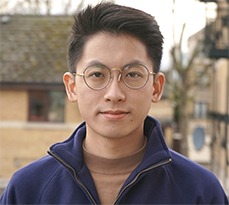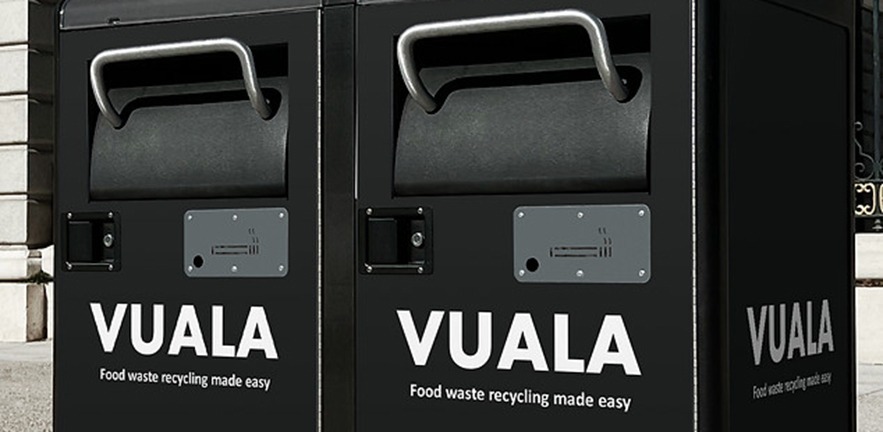
We’ve all been there – you’ve had lunch on the go and you’re trying to separate your rubbish into different bins for food, recycling, and general waste, all while juggling a cup of coffee. Now imagine you’ve finished your lunch and you simply throw everything into one bin, single use cutlery and all, and it’s automatically sorted into different categories.
That’s the vision of Vuala, based on the French word voila, because its founders say the auto-separation method “is like magic”.
“We’re not asking people to do anything extra. There’s no need to pre-sort their waste, and yet they’ll be contributing to the environment,” says the CEO of the firm Abiel Ma, who was recently awarded Young Innovator of the Year (2023) by Innovate UK for the venture.
How microorganisms separate food waste
Rather than magic or sleight of hand, the secret behind the separation lies within the bin itself: trillions of microorganisms. And like all the best tricks, the premise is remarkably simple – a combination of microbiological process and unique mechanical design. The waste falls into a central chamber of a compact bin and microorganisms digest the things they can, such as food waste, and leave behind the things they can’t, including anything metal or plastic. The special bins are designed so that the digested food is drained into a slurry tank, and there is a detachable compartment for the non-biodegradable waste left behind. Crucially, the bins are airtight, meaning no antisocial smells to attract vermin.
“We are an engineering company before a biology company,” says Abiel. “The system mechanics allow auto-separation of organic matters from all those indigestible wastes, as well as keeping the food waste that we treat within the bin without smell. This delays the need to empty the bins from once a week to once a month. It means 95% less labour, logistics and CO2 emissions. Our mission is to reduce 100 million tonnes of CO2 emissions in ten years. After separating the food waste, we send it to three locations as raw materials – anaerobic digestion plants to produce electricity, animal feed for pigs and fish, and to produce hydrogen.”
The venture is targeting businesses rather than public spaces, and has already secured a pilot at the Bradfield Centre, an office complex with a café at Cambridge Science Park, and has agreement for trials at Homerton and Trinity Colleges at the University of Cambridge. The startup has secured £60,000 of grants, including from Innovate UK, University of Cambridge, and Royal Institute of Great Britain. The Environment Agency has granted a 3 year waste treatment permit to Vuala, allowing it to treat, collect, sell and trade waste in the UK. They have also had their purchase order and are working on a second prototype.
Father and son team with background in research and development
Twenty-four-year old Abiel was born and raised in Hong Kong before coming to the UK to study International Business at University of Sussex. He ran 2 companies before founding Vuala, an educational platform and an ESG consultancy.
It was his father, Anthony Ma, who came up with the concept for the auto-separation bins. Anthony was previously Head of Water and Environmental Technology for a research institute established by the Hong Kong government for over 30 years, and outlined the idea in a lecture to the Hong Kong Institution of Engineers, where he was then chairman of the Environmental Division. His son was sitting in the audience.
“I just figured it was such a waste for him to do all that research, and I wanted to take it into the real world,” remembers Abiel, in perhaps a role reversal in the father-son relationship. “I spent quite a long time persuading him to quit his job and come and join me!”
Studying for MSt in Entrepreneurship provided knowledge to found a startup
To provide a solid foundation to build his startup, Abiel decided to study for a Master of Studies in Entrepreneurship (MSt) at Cambridge Judge Business School. He founded Vuala while on the programme, and wanted to prove to his dad that there was a market. As part of his research project, he analysed all the publicly available data he could find for every postcode area in London on the amount of food waste created per day, food waste density by borough, and which organisations could potentially be clients. His dad was persuaded and moved to the UK, joining Vuala as CTO.
“I learned a lot from the MSt”, says Abiel. “They are very hands on and practical about how to raise finance, how to manage teams in a rapid growth way, as well as understanding marketing, strategy and product development – all packed into a two-year programme.”
How support from Accelerate Cambridge transitioned an idea into an award-winning product
Vuala is currently supported by the Accelerate Cambridge programme run by the Entrepreneurship Centre at Cambridge Judge, and Abiel credits their lead mentor Michael Grange from Arm as being crucial in helping Vuala transition the idea into a product and developing a tech and business road map.
“We started out in Accelerate Cambridge as a tech company, but it helped us change our mindset and now we understand about patents and legal tools, and developing multi-streams of revenue,” says Abiel. “We have also secured our grants while on the programme, and won the 2022 Trinity Bradfield Prize, and I was awarded Young Innovator of the Year which is an incredible honour.”
“It also taught us about company values. We want the planet to be a better place and this core value runs through the business from choosing sustainable materials in the manufacturing, using electric vehicles for transportation, and hiring people with core values. Working with my dad is also a really precious moment.” Adds his father Anthony: “It’s really a blessing to work as a partner with my son and strive for our common vision. The experiences of attending accelerator programmes, joining award competitions, and fabricating our prototype together are just incredibly wonderful. We have never been so close with each other!”


